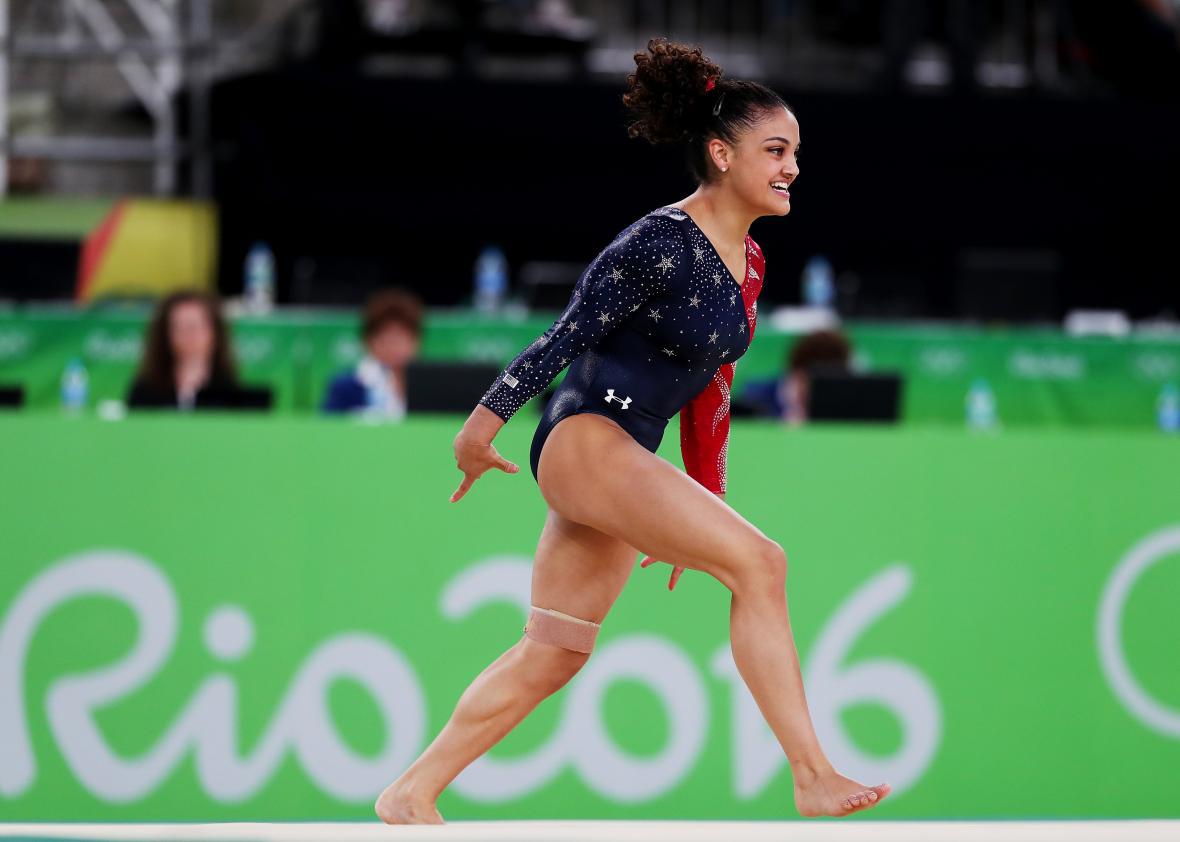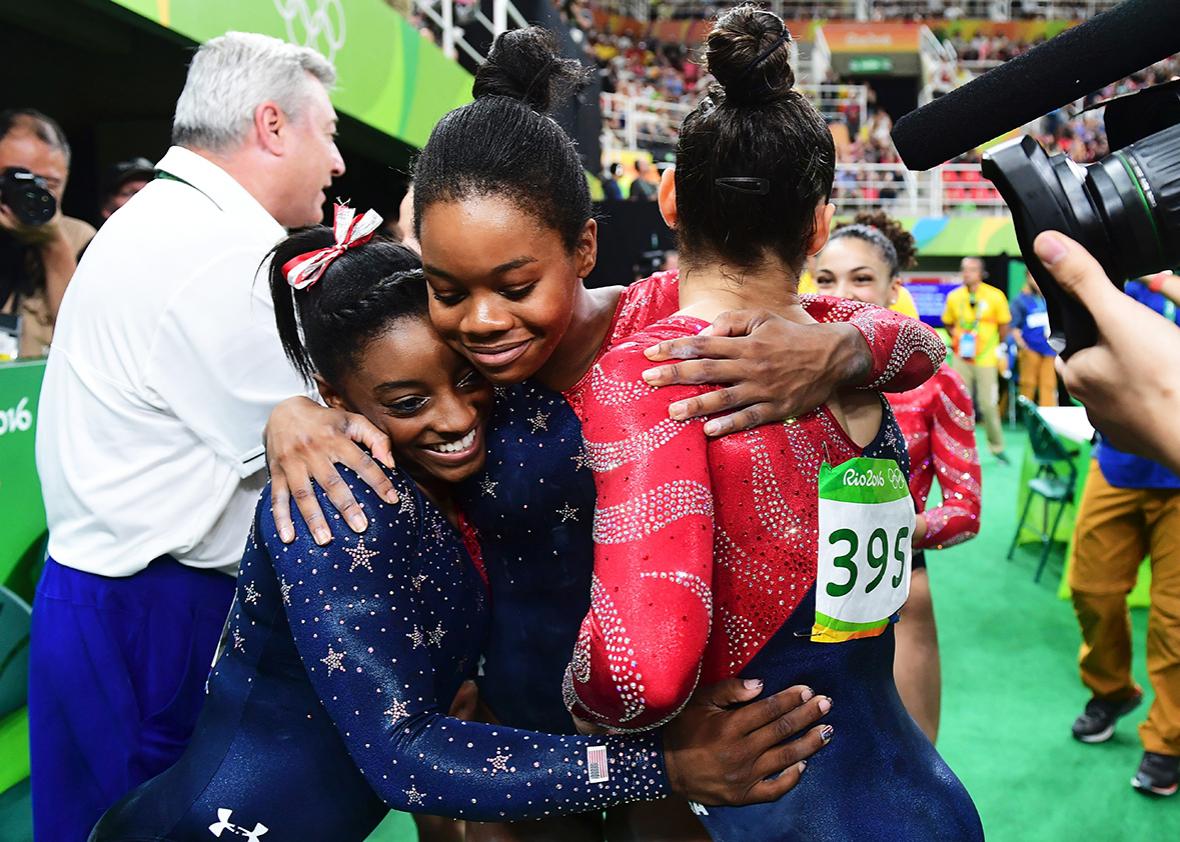In 2012 they were the Fab Five, then (when it turned out that name was taken) the Fierce Five. In 2016, the somehow-even-fiercer American women’s gymnastics squad—Simone Biles, Gabby Douglas, Aly Raisman, Laurie Hernandez, and Madison Kocian—has yet to unveil an epithet. What should we expect? The Dream Team? Yeah, that one’s taken, too. But the NBC promotional videos introducing Biles and then the entire lineup on Sunday shimmered with orisons to the “Olympic dream” and not giving up on your dreams. (Don’t worry, International Olympic Committee, we’ll keep writing blog posts.) What about the Five for Fighting? The Inexorable Gold Medal Vacuums?
Olympic gymnastics is both a team sport and an individual one. As a team, the 2016 squad is invincible—Biles, Douglas, Raisman, Hernandez, and Kocian finished a ridiculous 10 points ahead of second place in Sunday’s qualifying. As individuals, the brilliant aviation technology known as Simone Biles led the pack at 62.366 points, followed by U.S. captain Aly Raisman and defending Olympic gold medalist Gabby Douglas. The girls “didn’t just destroy, decimate, obliterate,” NBC’s Tim Daggett raved at the end of the night, unconsciously revealing the secret announcer practice of memorizing the English thesaurus in preparation for showtime. (No shade! When the human body tests its limits, language tries to keep up.) “Imagine a football game where it’s 120 to nothing.”
It’s great to be great, but who really wants to watch a 120–0 football game played by women in sparkly leotards? (I certainly do, but who else besides me?) So, on Sunday, NBC’s announcers abandoned what could have been a ho-hum story of American inevitability to zero in on intra-team drama and heartbreak. Because of an indefensible two-gymnasts-per-country rule, Douglas won’t compete in the all-around final. As the collective soared, one young champion crashed to the ground. How delicious!
On Sunday night, NBC spun each Old Glory–clad gymnast in her own direction. Start with Biles, who rose above the rest of the field in majestical awesomeness like a tiny yet impossibly luminous sun. Whenever she appeared, Daggett, Nastia Liukin, and Al Trautwig enthusiastically discharged their duties to point out 1) that the sun is really bright (“She does things you don’t see on the men’s side,” Trautwig emphasized) and 2) that the sun is extremely reliable. “Just sit back and relax,” Trautwig continued, as the 19-year-old phenom stretched for the floor exercises. Meanwhile, Biles’ unearthly dynamism, coupled with her speed, power, and poise, pressed Daggett into abstract temporal musings: “You are seeing the greatest of all time and that is worth your time all the time,” he said. A soft-focus video setting the stage for Biles’ Olympic debut presented her as a feisty teenager raised with loving encouragement by her grandparents Ron and Nellie, who are also her adoptive parents. She was shown getting a sparkly manicure (yellow dwarf stars, they’re just like us) and shoring up her confidence as an elite high school gymnast. But you can only stare into the sun for so long while the ant-size dramas of humanity transpire below.
Enter Laurie Hernandez. “She really sells the floor exercise,” we were forewarned as the effervescent 16-year-old, the youngest on the U.S. team, bopped up to the mat. Hernandez, regarded as the squad’s best dancer, was a delight—all frothy, bright expressiveness on the floor and balance beam, though coach Martha Karolyi didn’t allow her to vie for one of the all-around spots. “I definitely cried a lot this week,” Hernandez told reporters. Same!

Photo by Tom Pennington/Getty Images
Her teammate Madison Kocian tied Hernandez as best U.S. gymnast in a supporting role. Selected to strengthen America’s competitiveness on the uneven bars, the lithe teenager delivered a nimble, fairylike routine before floating away into the background, where she’ll flicker as a soft benevolent hologram until the next bars-related physical challenge.
The most intense drama of the night—and the one that most entranced NBC’s talking heads—was the race between Douglas and Raisman. It was tarnished champion against team captain. The adorable “Flying Squirrel” pursuing her comeback at the expense of the woman whose bronze medal slipped through her fingers in 2012. With Biles a shoo-in for one of the U.S.’s two spots in the individual all-around and few of the gymnasts from other countries offering much in the way of competition (though shoutout to Uzbekistan’s Oksana Chusovitina, owning the vault at age 41!), each event mostly served to propel the Gabby vs. Aly plot forward. Raisman took the lead in the floor exercise and vault, but Douglas closed the gap with a dazzling turn on the uneven bars. They both served up adequate-to-good performances on the balance beam—the event wherein, Daggett reminded us, “Aly’s going to have to open the door for Gabby.” As the camera panned to Douglas’ face in the moments after Raisman dismounted—had her teammate’s routine been flawed enough to send her to the finals?—Liukin added, “These next few minutes are just going to be agony.”
Agony was the surprise theme in Sunday’s coverage, which could have easily gone full champagne, fireworks, and Queen lyrics. “It’s called agony,” Liukin said again, during the uneven bars, as an image of Raisman’s nervously spectating parents flashed across the screen. Where the press might have focused on Biles’ outrageous talent and the gold medal fantasies of the young gymnasts—so close to being realized—they instead conjured the American women’s grit, resilience, and ferocity. “There’s always pain, always hurt,” Douglas’ voice intoned in one of those promotional videos. Footage of her falling off the balance beam flared in thousands of living rooms. “The hours in the gym, the sacrifice.”
Of course, the Olympics always presents us with these sorts of narratives—we got a taste of it, when Jordyn Wieber lost her spot in the individual finals to Raisman. But where was the sense of giddy celebration? Why did we spend so much more time on Gabby Douglas’ disappointment than Simone Biles’ glory and Aly Raisman’s second chance? Some strangely somber notes snuck into NBC’s coverage on Sunday, despite the astronomical and unmatchable wins of America’s favorite five-person gold-medal-attainment device. Don’t call them the Dream Team, on second thought. The NBC commentators, at least, wouldn’t want you to forget that at least one of these women is living a nightmare.
